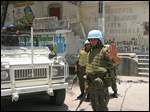Haiti Ranked Twelfth on Brookings Instability Index - A Fair Assessment or Not?
 According to the Brookings Institution, "Threats to international peace and security often come from the world’s weakest states. Such countries can fall prey to and spawn a host of transnational security threats, including terrorism, weapons proliferation, organized crime, infectious disease, environmental degradation, and civil conflicts that spill over borders." The Index of State Weakness in the Developing World ranks 141 developing nations, including Haiti, according to economic, political, security and social welfare. It is interesting to glance at, but how useful is it?
According to the Brookings Institution, "Threats to international peace and security often come from the world’s weakest states. Such countries can fall prey to and spawn a host of transnational security threats, including terrorism, weapons proliferation, organized crime, infectious disease, environmental degradation, and civil conflicts that spill over borders." The Index of State Weakness in the Developing World ranks 141 developing nations, including Haiti, according to economic, political, security and social welfare. It is interesting to glance at, but how useful is it?
According to the Index, Haiti is ranked twelfth. In other words, Haiti is the twelfth weakest state in the world. I did not expect Haiti to be highly ranked, but to suggest that Sierra Leone, Eritrea, North Korea, and Chad (thirteenth, fourteenth, fifteenth, and sixteenth respectively) are stronger than Haiti is a stretch.
 The Washington Times notes that Haiti is battling an image of fear that keeps away foreign visitors and investments. It doesn't help when Forbes names Haiti one of the 10 most dangerous places in the world and the Associated Press has called Port-au-Prince the kidnapping capital of the Americas.
The Washington Times notes that Haiti is battling an image of fear that keeps away foreign visitors and investments. It doesn't help when Forbes names Haiti one of the 10 most dangerous places in the world and the Associated Press has called Port-au-Prince the kidnapping capital of the Americas.
But have these experts been to Haiti lately? There have been major gains in security and kidnappings have been greatly reduced. Digicel has made the largest private sector investment in Haiti that the country has ever seen. The government inked a deal with Royal Caribean to expand operations in Labadee. A much needed airport expansion is taking place in Cap Haitian. Roads around the country are finally being repaired.
Is Haiti a violent country? Those of us who know the country would argue it is not. U.N statistics indicate 487 homicides in Haiti last year, or about 5.6 per 100,000 people. By way of comparison, the World Bank reports that the Caribbean's average homicide rate is 30 per 100,000, with Jamaica in the clear lead, as it has been for years, at 49 homicides per 100,000 people.
According to the Central American Observatory on Violence, even the Dominican Republic has a higher homicide per capita rate at 23.6 per 100,000. The Times article further notes that the American national homicide rate, collected by the U.S. Justice Department, is 5.7 per 100,000 in 2006. I live in Washington DC which, though trending downwards is much higher that the national average - yet we still have plenty of tourists and lots of investment.
The kindapping crisis was a major setback for Haiti. Haiti does not have a tradition of kidnapping and the wave from 2005 to 2006 caught most by surprise. It was a complex situation involving, at various stages, politically oriented criminals, drug thugs, deportees from the U.S., and opportunists. MINUSTAH has done an admirable job working with the government to reduce the number of kidnappings.
 The article also noted the number one concern of most Haitians is the rising cost of food. Haiti depends on other countries for fuel and foodstuffs. The price of rice and beans have doubled over the last three years while the income of Haitians has not. 80% of the population survives on less than two dollars a day. In terms of stability, this could have negative consequences.
The article also noted the number one concern of most Haitians is the rising cost of food. Haiti depends on other countries for fuel and foodstuffs. The price of rice and beans have doubled over the last three years while the income of Haitians has not. 80% of the population survives on less than two dollars a day. In terms of stability, this could have negative consequences.
Let's go back to the Index. Haiti is not yet stable or self reliant - but it has made significant progress, more than Brookings gives it credit for. Reading through the report in which the index is embedded, I found little that was useful. If the Index were linked to individualized recommendations for each country that the USG and the international community could take, as opposed to sweeping policy recommendations, then it could have real utility.
There are major challenges ahead but Haiti is making progress. It is neither a violent country nor on the verge of collapse. Welcome your thoughts.
Bryan
Add new comment